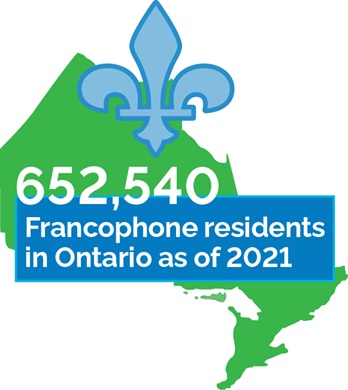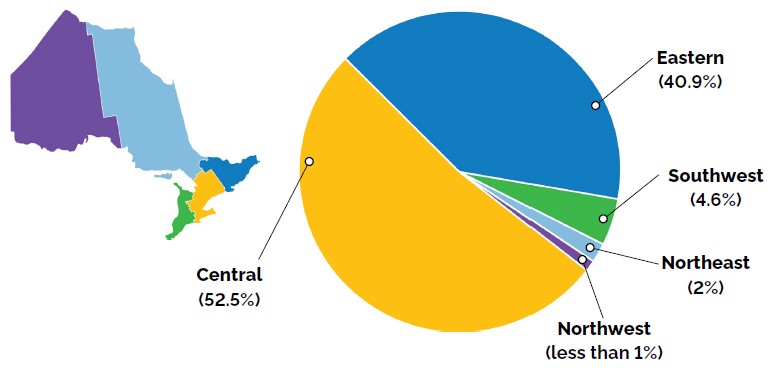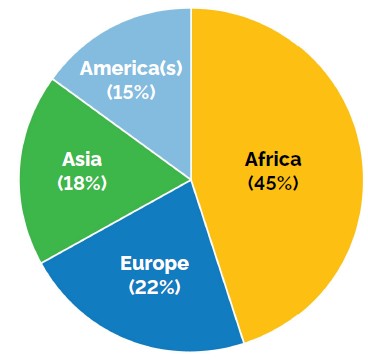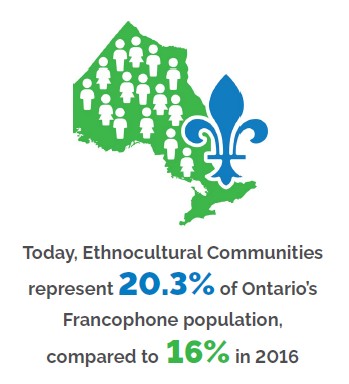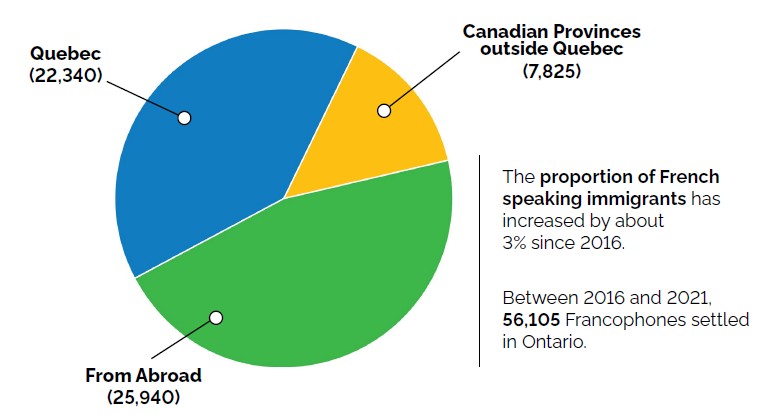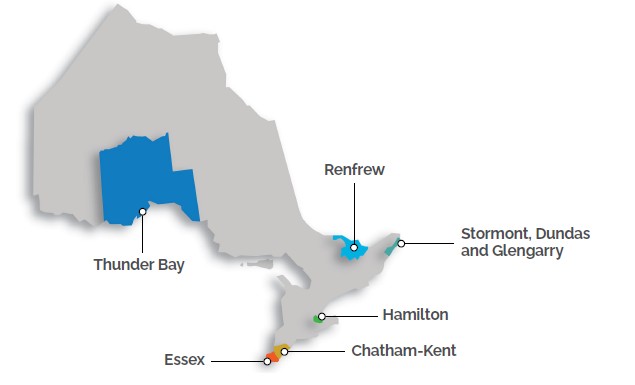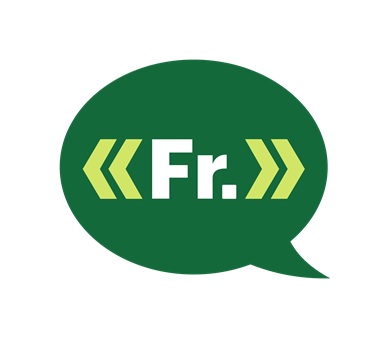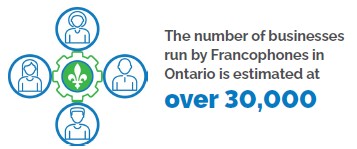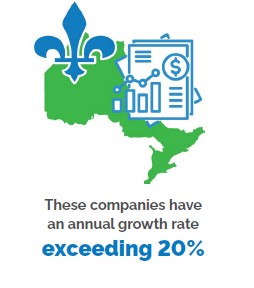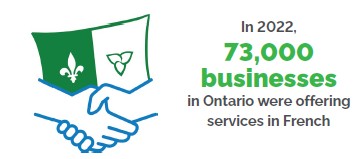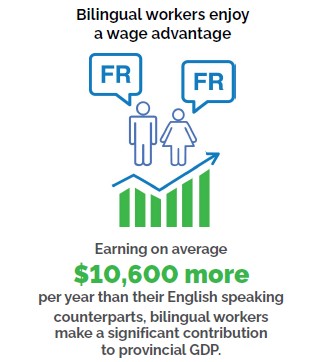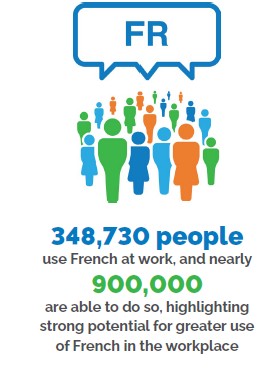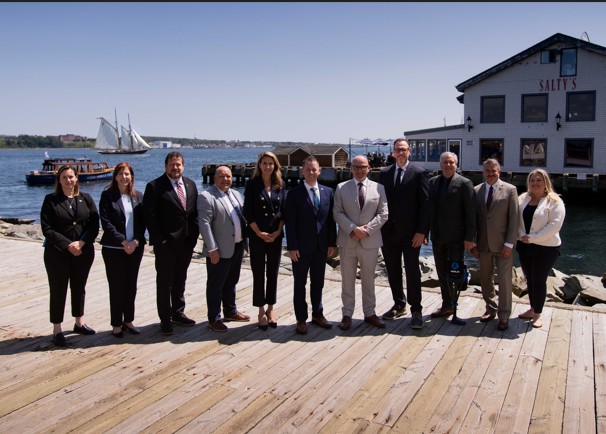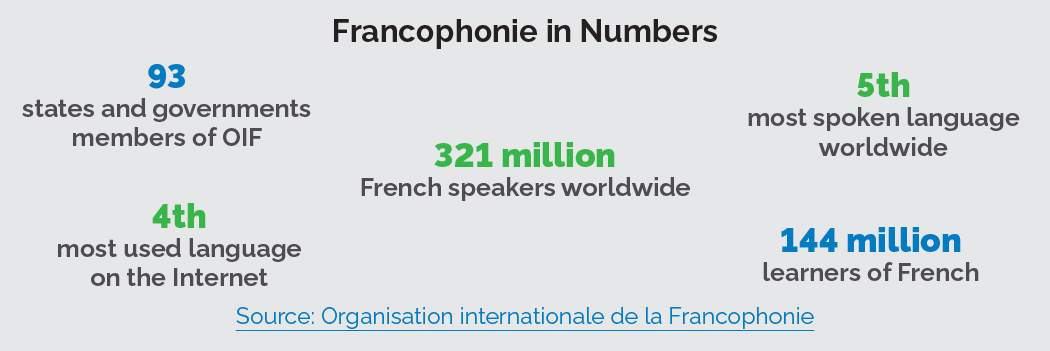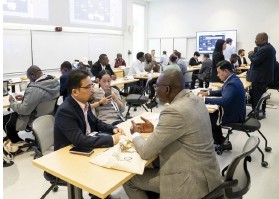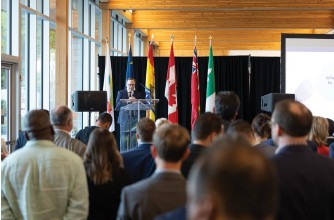2025 Report on Francophone Affairs
Read the 2025 report that highlights our efforts to support the social, cultural and economic development and influence of Ontario’s Francophone community.
Minister’s Message
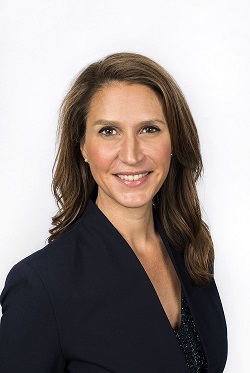
The Honourable Caroline Mulroney, Minister of Francophone Affairs
Madam Speaker,
I am pleased to table this report on Francophone affairs, highlighting the tangible progress made over the past year. This progress reflects the positive impact of the long-standing partnership between our government and the Francophone community, a close relationship that I am proud to be a part of, and one that is growing stronger as we continue to work towards a promising future.
For many years, we have worked to create an environment that welcomes, supports, and encourages Francophones, foreign-born and native-born alike, to reach their full potential. This dynamic remains at the heart of our commitment, and we continue our relentless efforts to lay the foundations for the vitality of our Francophone communities.
This annual report is a testament to the ongoing collaboration between our government and Francophones, ministries and partners in the non-profit, the public and the private sectors. By listening to one another, we are working together to support the Francophone community and ensure its full contribution to all aspects of Ontarian society.
The French Language Services Strategy and the Francophone Economic Development Strategy are the pillars of this approach. These tools will continue to support the growth of the Francophone community by promoting its sustainability and development through mechanisms that enable every citizen to settle, invest, prosper, and contribute to the life of their community and the province.
This year, Ontario had the opportunity to showcase its efforts to the international Francophone community. Our involvement in the Organisation internationale de la Francophonie, the Economic and Trade Mission to North America, and the Sommet de la Francophonie in France not only demonstrated our commitment to the Francophonie, but also reminded us of the province’s key role in promoting it.
I sincerely thank the Premier, the members of Cabinet and our many partners in the public, broader public, and private sectors for their unwavering support. These joint efforts have made it possible to improve the quality of services offered to the Francophone community, and to strengthen its central place in Ontario society. By promoting the prosperity of our Francophonie, we are helping to build a more inclusive, dynamic and prosperous Ontario as our government recognizes that linguistic and cultural diversity is an essential lever for the development and future of our province.
The Honourable Caroline Mulroney
Minister of Francophone Affairs
Introduction
Mandate and Role of the Ministry
The Ministry of Francophone Affairs’ mandate is to administer the French Language Services Act and to put in place measures and policies to ensure that all Francophones in Ontario have access to provincial government services in French. Its mission is also to promote their full participation in the province’s social, cultural, economic, and political life, while honoring their linguistic and cultural heritage.
Francophone Demographic Profile in Ontario
Ontario’s growing population is supported by Francophone immigration, which plays a vital role in enriching its Francophonie and preserving its cultural diversity. This dynamism is reflected both in the diversity of the province’s Francophone communities, whether those well-established or those choosing the province as their new home. In 2024, Ontario exceeded its Francophone immigration target by 5% for the third consecutive year by welcoming approximately 19,700 Francophones. This represents 9.6% of new permanent residents, or nearly one in 10 French speaking newcomers to Ontario.
Ontario is home to more than 652,000 Francophones
According to the 2021 census and based on the Inclusive Definition of Francophone (IDF), the Francophone population is now 652,540, an increase of 30,125 since 2016.
Expanding the Definition of the French Speaking Population for Greater Inclusivity
Since 2007, work was undertaken to revise the definition of the Francophone population in Ontario, to better reflect the dynamic and diverse reality of this constantly evolving community. The previous method, which did not consider the new realities of Francophones, particularly those living outside Quebec, has given way to a more inclusive approach.
This definition was adopted by the Ontario government in 2009, with the introduction of the Inclusive Definition of Francophone (IDF). This new definition broadens the concept of Francophone to include all people who, while not having French as their mother tongue, speak French at home.
This step has redefined the Francophonie in Ontario, giving greater scope to cultural communities and mixed families. It has also strengthened the sense of belonging, enabling a greater number of Francophones, even non-native speakers, to recognize themselves and participate actively in the cultural, social, and economic life of the province.
In 2023, the Ministry of Francophone Affairs collaborated with Statistics Canada to establish the demographic profile of Ontario’s Francophone population, according to this inclusive definition. The figures in this document have been calculated by Statistics Canada according to the IDF and may differ from those of other sources using a different definition.
Ethnocultural Francophone Communities — By Region of the Province
Francophone Immigrants — Place of Birth Outside of Canada
The Proportion of French Speaking Immigrants in Ontario
French Language Services
Overview of Ontario’s French Language Services Strategy
Launched in November 2021, Ontario’s French Language Services Strategy aims to enhance access, quality, and availability of French language services for the province’s Francophone population.
Ontario’s French Language Services Strategy is based on three pillars:
- Modernizing the legislative framework, including the French Language Services Act
- Growing the Francophone and bilingual workforce
- Optimizing service planning and delivery
Modernized Legislative Framework
Ontario’s legislative framework for the delivery of French language services is comprised of the French Language Services Act and its regulations.
Together, the Act and its regulations set out legal obligations for the delivery of services in French for ministries, their agencies, designated agencies under the Act, and third-party service providers delivering services on behalf of government.
French-language service obligations apply to service points located in designated areas under the Act, as well as head offices.
The Act entrusts the Ministry with the crucial role of ensuring that these rights are upheld, collaborating with other ministries and agencies to ensure that French-language services are accessible and of high quality.
Since 2021, significant progress has been made in implementing the Strategy. The following section provides highlights from this past year.
Designation of Areas
Ontario’s Designated Areas
A designated area is a geographic zone in which Francophones have the right to access French language services under the French Language Services Act.
Designation is applicable where the Francophone population exceeds 5,000 in an urban area or represents 10% of the total population of the region (regional municipalities, counties, towns and villages). In some cases, a region may be designated based on the high degree of community support for the designation.
According to the 2021 census, 80% of Ontario’s Francophones live in a designated area.
Sarnia, Now Officially Designated for the Active Delivery of French Language Services!
Since November 1, 2024, Ontario government services have been available in French in Sarnia, in accordance with the French Language Services Act. The City of Sarnia’s designation under the Act stems from a request submitted by the Regroupement des organismes francophones de Sarnia-Lambton and the Centre culturel Jolliet, two local francophone organizations.
Following this designation, sixteen government ministries and agencies have established the capacity to guarantee French-language services on par with those offered in English:
- Liquor Control Board of Ontario (LCBO): The Crown corporation recruited French speaking employees to meet the needs of French-speaking customers, and posted signs to inform customers that bilingual staff wear a green badge with a white fleur-de-lys, making it easier to identify French speaking employees.
- Ministry of the Attorney General: Through the French language services team of the Victim/Witness Assistance Program, the Ministry offers several French language services in the Western Region, now including Sarnia. These include telephone counselling in French, hearing preparation in French, as well as bilingual voicemail and e-mail signatures. Calls are answered with an active offer of services in French, and signs, envelopes and letters of introduction are also in French, ensuring clear and accessible communication for Francophone clients.
- Ministry of the Environment, Conservation and Parks: The Drinking Water and Environmental Compliance Division has made significant progress in bilingual compliance. A full-time bilingual staff position has been created within the Sarnia office, which offers both virtual and in-person services. The Interactive Voice Response (IVR) system in the offices is bilingual. The same applies to staff voice messages and signage in public areas.
- Ministry of Tourism, Culture and Gaming: A full-time bilingual staff position has been filled within the Regional and Corporate Services Branch in Windsor to serve the City of Sarnia. The position offers both virtual and in-person services.
Sarnia’s designation reflects the growth of a Francophone community that benefits from the Ontario government’s support to ensure its continuity.
Expansion of Regions Designated for Access to French-Language Services
As part of ongoing improvement of services offered to the Francophone community, the Ministry of Francophone Affairs proposed an update to the list of areas designated under the French Language Services Act. In December 2024, Ontarians were invited to consult this proposal on the Ontario Regulatory Registry and submit their feedback.
If approved, the proposal would expand the designated areas, enabling an additional 7,000 Francophones to benefit from French language services in the area where they live.
These services cover various fields, such as legal and community services. Updating the list of designated regions would also include changing the names of a few municipalities that have changed since their designation.
This update would be followed by a three-year implementation period to promote the effective expansion of services in designated areas.
Designation of Organizations
Publicly funded organizations can apply for designation under the French Language Services Act (FLSA) to affirm their commitment to serving the Francophone community in their region. Introduced in 1994, this designation requires organizations to provide services in French, depending on the extent of their designation. Some organizations may obtain full designation, meaning that all their services meet the requirements of the designation and are offered in French, while others receive partial designation, for specific services and programs offered in French.
Once designated, these organizations are registered under Ontario Regulation 398/93: Designation of Public Service Agencies, guaranteeing their conformity with legal requirements.
Updating Ontario Regulation 398/93
The Ministry is implementing a three-year plan to update the regulation. This ambitious project has already yielded tangible results. On January 1, 2025, the most significant revision of this regulation to date came into effect, with updates to 73 organizations designated under the regulation. This brings to 132 the number of organizations whose information has been updated since January 1, 2023.
Launch of Three-Year Evaluation Feature on April 1, 2024
The Ministry is pursuing its work initiated in 2019 to simplify the designation process so that a greater number of organizations offering French language services can become designated under the French Language Services Act.
In the spring of 2024, the Ministry updated the French Language Services Designation Tool to include a three-year evaluation feature to validate organizations’ compliance with established requirements. This evaluation confirms that organizations meet the Ministry of Francophone Affairs’ designation criteria and maintain a high level of quality in the delivery of French language services.
A New Visual Identifier for Designated Organizations
The Ministry of Francophone Affairs is introducing a first ever visual identifier to highlight designated organizations and make it easier to identify French language services across the province. This initiative was unveiled at the annual convention of the Assemblée de la francophonie de l’Ontario (AFO) in October 2024.
Inspired by the deep green of the Franco-Ontarian flag, this mark represents a strong, unifying visual link, fostering a sense of belonging within the Francophone community. Framed within a speech bubble, the French quotation marks illustrate the government’s commitment to promoting dialogue in French and the delivery of French language services.
The visual identifier is intended for organizations that have obtained a partial or full designation under the French Language Services Act for their French language services. The government will inform organizations directly of the possibility of using the official mark once it is available on the digital designation platform.
Developing HR Capacity
As part of its commitment to improving access to French language services, the Ontario government has implemented several initiatives to ensure effective, ongoing delivery of French language services within its ministries and agencies. Key measures include:
Bilingual OPS Job Postings: A Driving Force for Attractiveness and Competitiveness
Since January 15, 2024, all public-facing Ontario Public Service (OPS) job postings have been published in English and French. Led by Treasury Board in partnership with the Ministry of Francophone Affairs, this initiative demonstrates the government’s commitment to strengthening the bilingual capacity of the public service.
Since the launch, the OPS has posted nearly 3,000 external job advertisements in both English and French, positioning the Ontario Public Service as an inclusive employer that actively supports Ontario’s French Language Services Strategy.
Coordinators to Oversee French Language Services
Under the French Language Services Act, all government ministries are required to have a French language services coordinator to support them in fulfilling their linguistic obligations.
Their role is to ensure that ministry and agency services are available in French, by requiring the use of French in official communications, providing advice to ministries to improve services, and monitoring the quality of these services while assessing the needs of Francophone communities. The Ministry of Francophone Affairs works closely with coordinators to monitor that ministries’ French language service obligations are met.
The Ministry of the Environment, Conservation and Parks (MECP) French language services coordinators launched a series of quarterly newsletters on French language services at the end of the 2023–2024 fiscal year. The first bulletin, issued to mark the first anniversary of the coming into force of Regulation 544/22: Active Offer of Services in French — Prescribed Measures, emphasized the importance of bilingual greetings and the protocols to be followed to ensure continuity of French language services. The bulletin, sent by the Ministry’s executive director to deputy ministers and French language services coordinators in several ministries, aims to support the government’s strategic priorities.
Reminder of the Active Offer Regulation
In the wake of the modernization of the French Language Services Act, a new regulation defining the measures that organizations subject to the Act must put in place to ensure an active offer of services in French came into force on April 1, 2023. The regulation requires ministries, agencies and other organizations providing services to integrate the offer of services in French from the very first contact with citizens. The onus is now on the service provider to identify these services, rather than on Francophone applicants. This innovative regulation provides Ontario with one of the most elaborate frameworks for the active offer of government services.
The Mobilizing Role of the Ministry of Francophone Affairs
The Ministry collaborates with other ministries to meet the growing needs of the Francophone community by ensuring the excellence and continuity of French language services.
Below are a few examples of how partner ministries have implemented the French Language Services Strategy:
Investing in a Prosperous Future
Ministry of Colleges, Universities, Research Excellence and Security
Several initiatives have expanded student access to quality French language postsecondary education, while addressing pressing needs in areas key to the development of Ontario’s Francophonie. These include:
- The Université de l’Ontario français (UOF) expanded its academic offering through the launch of a Bachelor of Business Administration program, which already covers, among other subjects: Human Resources Management and Development, Financial Planning, Organizational Management and Development, and Management of French Language Services and Official Languages.
- With provincial support in 2023‒2024, the University of Ottawa and UOF have increased the number of places funded specifically for French language teacher training programs. This includes the funding of 70 additional spaces at the University of Ottawa in 2023‒2024 and 2024‒2025, as well as an increase in enrolment capacity at UOF to accommodate up to 160 full-time equivalent (FTE) spaces per academic year.
Ministry of Children, Community and Social Services
An investment of $750,000 over three years was made to support a pre-apprenticeship training program in heavy equipment mechanics at Collège Boréal, specifically designed for Francophone women. The program provides participants with simplified access to the heavy equipment mechanics industry, with free 21-week training followed by an 8-week internship.
Investing in Northern Francophonie
Ministry of Northern Economic Development and Growth
Since June 2018, the Northern Ontario Heritage Fund Corporation (NOHFC) has invested more than $106 million in 914 Francophone projects. These investments have created or maintained 1,387 jobs, contributing to the economic development and vitality of the Francophone community in Northern Ontario.
To maximize results and ensure the success of Francophone project applications, Francophone applicants to NOHFC programs are assigned bilingual Northern Development Advisors (NDAs) from the Ministry of Northern Economic Development and Growth at every stage of the application process.
Ministry of Health
In 2024, the Ministry of Health invested over $1.8 million over four years to extend translation services to Ontario Health’s public health offices and teams in the North. This initiative ensures compliance with the Long-Term Care Act and the French Language Services Act. The expansion will provide English-to-French translation services for documents intended for the public, improving the availability of essential health information in French across the province. The goal of this investment is to make essential health information accessible to Francophone communities, improve navigation and ensure that patients, clients and residents of long-term care facilities receive essential health updates and services in the language of their choice.
Investing in an Inclusive Society
Ministry of Seniors and Accessibility
In 2022‒2023, the Ministry funded Elder Abuse Prevention Ontario (EAPO) to develop the Réseau de prévention de la maltraitance des ainés francophones. This project continued to grow in 2023‒2024 thanks to extended funding and collaboration with the Fédération des aînés et des retraités francophones de l’Ontario (FARFO). In 2023‒2024, EAPO organized several meetings, educational sessions, and training courses, reaching a wide audience. Additionally, the Ministry allocated close to $0.7 million to 14 Seniors Active Living Centre (SALC) programs offering programming in French for Francophone seniors and to an additional 40 SALC programs offering programming in both official languages. The programming included social, cultural and recreational activities.
Ministry of Long-Term Care
The Ministry continues to pursue its goal of providing care that is adapted to linguistic, ethnic and cultural needs. Between April 2024 and March 2025, two long-term care projects in Ontario targeting Francophones were launched. These operators proposed to offer services adapted to the French speaking population, including beds reserved for this community.
Investing in French Language Services
Ministry of Health
Home and Community Care Support Services Hamilton Niagara Haldimand Brant partnered with Centre de santé communautaire Hamilton to introduce a new Francophone clinical care coordinator position. This position is embedded within the community health centre and supports patient care needs in the community related to care coordination and system navigation. The clinical care coordinator also assists with nursing assessments which can support emergency department avoidance. This role also enabled staff to engage with French speaking patients in Hamilton, outside of the community health centre, to offer care coordination services in their desired language.
A Government that Listens
French Language Services Unit of the Office of the Ombudsman
The Ontario Ministry of Francophone Affairs and the French Language Services Commissioner share a commitment to the continuous improvement of services to the Francophone community.
Independent of government, the Commissioner reviews complaints and makes recommendations to improve the delivery of French language services. The Ministry works closely with other provincial ministries to analyze, and respond to, the recommendations made in the annual reports and investigation reports of the French Language Services Unit of the Office of the Ombudsman.
As part of this process, the government regularly informs the Commissioner of progress in evaluating and implementing its recommendations.
The government congratulates the Ontario Provincial Police (OPP), winner of the inaugural Ombudsman’s Award for Good Governance. The OPP was recognized for improving its French language services, notably by resolving technical problems related to the simultaneous broadcasting of AMBER Alerts in English and French. It has also implemented exemplary initiatives to actively offer services in French, in compliance with the French Language Services Act. These efforts were highlighted in the Annual Report of the French Language Services Commissioner, which was published by the Ombudsman’s Office in December 2024.
An Essential Channel for Informing the French Speaking Community of Key Announcements and Initiatives
In June 2024, the Ministry of Francophone Affairs launched its LinkedIn account to modernize and amplify communication with the Francophone community. This bilingual platform serves as a space to disseminate important announcements, not only from the Ministry, but also from other Ontario ministries and organizations working for Ontario’s Francophonie. The launch of this account demonstrates a renewed commitment to transparent, accessible and real-time communication with the community.
Strengthening Francophone Representation in the Province
Canada-Ontario Agreement on Minority Language Services
The Canada-Ontario Agreement on Minority Language Services is a multi-year collaboration between the federal and provincial governments to support the planning and delivery of French language services to the Francophone community. It aims to create new French language services and improve existing ones, in order to better meet the needs of Francophones.
The Ministry of Francophone Affairs plays a central role in this agreement by representing the specific needs of the province’s Francophone population.
In 2024, Ontario signed a new agreement, with an increased annual contribution of $4,000,000 for each of the four fiscal years from April 1, 2024, to March 31, 2028.
Following the signing of the agreement on March 20, 2024, ministries were invited to submit projects to the Ministry of Francophone Affairs, aimed at improving access to and quality of French language services in areas such as justice, education and the bilingual economy.
Examples of initiatives funded under the new agreement:
- Anti-Black Racism in Ontario’s Public Education System — Francophone Component: The Ontario Human Rights Commission (OHRC) developed an action plan to combat anti-black racism in education, with targeted consultations with the black Francophone community. This initiative culminated in an action plan launched in autumn 2024, including French translations and interpretations in Quebec Sign Language (Langue des signes québécoise, LSQ).
- Empowering Northern Francophone culture and creativity: The Ontario Arts Council (OAC) supports Francophone artists in the North who face barriers in accessing resources. This project aims to overcome these barriers, preserve and promote Francophone cultural heritage and provide professional development opportunities for Francophone artists in various fields, while establishing arts education programs for Francophone students.
- Increased FLS capacity at the Workplace Safety and Insurance Board (WSIB): With funding from the agreement, the WSIB is building its capacity to offer French language services by recruiting bilingual staff, raising awareness of the services offered and supporting the retention of French speaking employees in this vital sector.
Economic Development in Ontario
Overview of the Francophone Economic Development Strategy
Developed by the Ministry of Francophone Affairs with several partner ministries, the Francophone Economic Development Strategy is based on three main pillars:
- Francophone entrepreneurship and innovation
- Developing a skilled bilingual workforce
- Promotion of the French language as an economic asset
This approach builds on the findings of previous consultations and recommendations to support the province’s Francophone business ecosystem.
Following the recommendations made, one of the government’s first actions was to grant start-up funding to support the development of a Francophone business network in Ontario, the Fédération des gens d’affaires francophones de l’Ontario (FGA), in 2021.
The Strategy represents a firm commitment by Ontario to strengthen and promote the Francophonie as an engine of economic prosperity.
Fédération des gens d’affaires francophones de l’Ontario (FGA)
Since January 2021, the Fédération des gens d’affaires de l’Ontario (FGA) has offered mentoring, training, a database of Francophone entrepreneurs and a concierge service to foster business opportunities. Today, with over 5,000 members, it is a key player in the Alliance des patronats francophones and the new Alliance de la francophonie économique canadienne (AFEC), putting it in an excellent position to support Ontario’s French speaking entrepreneurial businesses.
The FGA, with the support of the Ontario government, published a second White Paper on the Franco-Ontarian Economy (available in French only) in January 2025, highlighting the importance and potential of Ontario’s Francophone business ecosystem. Funded by the Ministry of Francophone Affairs in the wake of a study conducted in 2022, this report highlights the strong presence of French-speaking companies in the province and their significant growth potential.
These data highlight the fact that the Francophonie is an exceptional hub for business development. They also reflect the relevance of one of the three pillars of the Economic Development Strategy, namely support for market expansion as a key lever to ensure their growth.
Funding to Support Entrepreneurship
Recognizing the Francophonie as a major economic asset, the government increased its annual envelope for Francophone economic development to $800,000 in 2023‒2024. This funding strengthens the capacity of French speaking small and medium-sized enterprises (SMEs) in Ontario and enhances their economic prospects in global markets, thereby contributing to the province’s economic growth.
In 2024‒2025, this annual investment made it possible to:
Strengthen Entrepreneurship with the SÉO and Impact ON — Training and Support for Franco-Ontarian Entrepreneurs
The allocated budget supported the Société Économique de l’Ontario (SÉO), which received $125,000 to deliver entrepreneurial training specifically designed for Ontario Francophones and newcomers. These courses were designed to help participants develop their entrepreneurial skills, manage their finances effectively, add value to their work, promote their projects, expand their professional network and succeed in the world of entrepreneurship. Thanks to government support, the SÉO played a decisive role in the empowerment of participants, the creation of economic opportunities and the growth of Francophone entrepreneurship in Ontario.
Impact ON (formerly the Conseil de la coopération de l’Ontario), for its part, received $200,000 to set up a global support ecosystem dedicated to women entrepreneurs. This funding enabled the development of an individualized coaching program, monthly group training sessions, a new cohort of the intensive incubation program, as well as personalized support. Networking events also accompanied the program, aimed at empowering women entrepreneurs and fostering their success in the business world.
Support French Language Service Providers with the Assemblée de la Francophonie de l’Ontario
Non-governmental organizations (NGOs) play an essential role as economic drivers, contributing to both social development and local economic dynamics in Ontario. To ensure their effectiveness and sustainability, it is essential to support the skills development of their teams.
Through a $175,000 grant to l’Assemblée de la francophonie de l’Ontario (AFO), the Ministry actively supported training of employees and volunteers of Franco-Ontarian organizations. This funding enabled AFO to offer targeted training programs in eight areas essential to strengthening skills and management within these organizations:
- self-generated financing
- government financing
- delivery of programs and services
- governance
- financial management
- human resources
- communications and public relations
- marketing
Assist the Fédération des gens d’affaires de l’Ontario: A Pillar of Ontario’s Francophone Economic Development
The government granted $250,000 to the Fédération des gens d’affaires de l’Ontario (FGA) to:
- maintain and strengthen its activities and support the free services it offers to Ontario’s Francophone entrepreneurs and organizations
promote and maintain the FGA’s portals, Quartier d’affaires and inkubo
- organize networking events such as the Franco-Ontarian Business Forum (Forum franco-ontarien des affaires)
- fund the second phase of an in-depth study on Francophone businesses (White Paper on the Franco-Ontarian Economy — 2025 Edition)
- support Ontario’s participation in networking and business opportunities under the aegis of the Organisation internationale de la Francophonie (OIF)
In 2024, the province’s French speaking business sector took a major step forward thanks to a strategic partnership between the Fédération des gens d’affaires and the Ministry of Economic Development, Job Creation and Trade (MEDJCT). This partnership has enabled the Fédération to benefit from $500,000 in funding over two years, in recognition of the impact of this province-wide support organization for Francophone entrepreneurs and SMEs.
Thanks to this funding, the Fédération is better able to refer Francophone entrepreneurs to programs funded by MEDJCT, which are offered in English and therefore sometimes unfamiliar to Francophones:
- the Ontario Centre of Innovation, the Regional Development Program, the Regional Innovation Centres and their programs such as Collaborate 2 Commercialize, Ready 4 Market grants, Business Acceleration Program, Youth Entrepreneurship Fund.
Above all, the Fédération will be working closely with the network of Small Business Enterprise Centres, to enable francophone entrepreneurs to benefit from their programs, including the Starter Company Plus and Summer Company grants.
At the same time, the Ministry of Francophone Affairs supports these efforts by promoting Francophone entrepreneurial initiatives, while referrals to the funding programs of the Ministry of Economic Development, Job Creation and Trade represent an important lever for supporting the growth of Franco-Ontarian businesses.
Funding to Strengthen Ontario’s Cultural and Economic Vitality
The government remains a key player in strengthening the cultural and economic vitality of Ontario’s Francophone communities, supporting local community and entrepreneurial initiatives that offer concrete opportunities for Francophones, while promoting their overall well-being.
Francophone Community Grants Program (FCGP)
The Francophone Community Grants Program (FCGP) supports the cultural and economic vitality of the Francophone population by funding projects that improve front-line services and promote the French language and the Francophone culture.
After launching the program in 2017 with an envelope of $1 million, the province invested an additional $1 million as of 2021‒2022, bringing the total annual contribution to $2 million.
In 2024‒2025, through to the Canada-Ontario Agreement on Minority Language Services, an additional $1 million was allocated, bringing the total envelope to $3 million. This funding helped community, social and business organizations that offer services in French or target Francophone markets to:
- strengthen the training and recruitment of French speaking workers
- encourage the development of French language services, particularly in the health and social services sector
- stimulate the economic prosperity of the Franco-Ontarian community
Thanks to the increased envelope, the Ministry supported a total of 73 projects, including the following:
- Vision’Elles: Réinventer le Futur au Féminin, a series of six workshops aimed at expanding professional networks and strengthening the leadership skills of French speaking women
- Compétences 360: accélérateur de carrière offered four in-person and virtual workshops focusing on collaboration, adaptability, problem-solving and employability communication to 300 participants
- Care Companion: a project to improve elder care by recruiting eight new employees and training two bilingual employees to fill the healthcare labour shortage in Northern Ontario
- Employability Mentorship Program for Francophone Newcomers in the Greater Toronto Area: aimed at supporting the professional integration of French speaking newcomers to the Greater Toronto Area
Ontario Within the National and International Francophonie
The Ministry of Francophone Affairs leads strategic efforts with its national and international Francophone partners to deploy initiatives aimed at strengthening the presence and impact of the Francophonie.
In Canada
On the national scene, Ontario plays a significant role in the Minister’s Council on the Canadian Francophonie (MCCF). Meetings between ministers and the network of Francophone civil servants under their authority help identify risks and possibilities in Francophone minority communities. It was at one of these meetings that Ontario’s Minister of Francophone Affairs received the support of her colleagues to conduct a study on the supply and demand of bilingual labour in a pan-Canadian context.
Since the publication of the results of this study, the MCCF has been carrying out additional work to identify bilingual workforce needs in these communities, thus contributing to better planning of human resource requirements on a national scale. With this in mind, Ontario played an instrumental role in supporting the first economic Agora, a major event organized by the MCCF in August 2024 in Halifax.
The aim of the meeting was to bring together key stakeholders to identify concrete ways of strengthening the contribution of the French speaking community to Canada’s economic prosperity. At the Agora, several issues were discussed, including the importance of meeting bilingual workforce needs across the country, and opportunities for francophone immigration.
Ontario was well represented at the event, with presentations and panel discussions from:
- Roda Muse, Government of Ontario
- Aurélie Lacassagne, Université de Hearst
- Julien Geremie, Impact ON
- Dominic Mailloux, Alliance de la francophonie économique canadienne (AFEC) and Fédération des gens d’affaires (FGA)
- Robert Manseau, Commerce Management Group
Ontario played an instrumental role in supporting the first economic Agora, a major event organized by the MCCF in August 2024 in Halifax.
Towards New Agreements: Upcoming Agreements and Ongoing Negotiations
To strengthen interprovincial ties and promote the growth of the French speaking community nationwide, the government is actively involved in negotiations and supports the implementation of new agreements.
Cooperation and Exchange Agreement with Québec with respect to the Francophonie
This agreement between the Government of Québec and the Government of Ontario aims to:
- develop Francophone communities in Canada
- promote the use of the French language
- strengthen the ties between Francophones of both provinces
- contribute to the strengthening of an inclusive pan-Canadian Francophonie.
As such, Ontario and Québec together invest up to $500,000 annually to support joint projects. In 2024‒2025, a total of 21 projects were approved, mainly in the areas of economic development, culture, education and tourism.
Agreement with New Brunswick
A joint declaration was signed between Ontario and New Brunswick in April 2024 to strengthen cooperation on Francophone issues and meet bilingual labour needs outside Québec. This partnership also includes collaboration on Francophone immigration.
A working group has been formed to develop an agreement and roadmap.
On the International Stage
Collaboration within the global Francophone family is essential and a source of many opportunities for socio-economic partnership initiatives.
Through its participation in the 2022 Summit of the Organisation internationale de la Francophonie (OIF), Ontario engaged in several bilateral discussions with potential international partners, confirming its intention to continue playing an active role within the OIF. This approach reflects Ontario’s commitment to position itself as a dynamic and welcoming hub for students, families and businesses, fostering an environment that encourages growth, collaboration and opportunities.
In 2024, Ontario’s trade with member countries of the OIF totaled $29.9 billion CAD, accounting for 47.4% of Canada’s total trade with this group. This amount includes $24.0 billion in imports (representing 54.2% of the national share) and $5.8 billion in exports (31.2% of the national share).
Organisation internationale de la Francophonie (OIF)
Founded in 1970, the Organisation internationale de la Francophonie (OIF)’s main mission is to promote active solidarity between its member states and governments. These members represent more than a third of the member states of the United Nations and a population of over one billion people, including 321 million French speakers. As part of the implementation of its Francophone Economic Development Strategy, the province’s participation in OIF activities aims to develop an economic space conducive to growth and employment by intensifying social and commercial exchanges with the global Francophonie.
Economic Mission
The OIF promotes French speaking countries as attractive destinations for companies and investors by organizing multilateral economic and trade missions.
Co-sponsored by Ontario, the OIF’s fifth economic and trade mission, and its first in North America, brought together in Montreal and Quebec City more than 80 international companies from different French speaking regions to identify and secure business and investment opportunities. This international delegation was able to meet with 200 companies from Quebec, Ontario and New Brunswick through a series of business-to-business (B2B) activities.
The Ontario delegation was composed of 14 French speaking or bilingual companies operating in sectors designated by the OIF, selected for their ability to operate in French and to do business internationally. They had the opportunity to explore business opportunities with companies and partners from the following sectors:
- renewable energies, including energy efficiency, energy transition, transport electrification and the battery industry
- digital services, including healthcare technologies, education technologies, cybersecurity and the video game industry
- agribusiness
Spotlight on French Ontario at the Francophonie Summit in 2024
The Summit of La Francophonie is the highest governing body of the Francophonie and takes place every two years. It brings together the heads of state and government of all member countries. During the 2024 Summit, held in Paris, Ontario made its mark, positioning itself as a must-visit destination for tourism, a preferred host for French speaking students and professionals, as well as a business hub in North America. This far-reaching presence was demonstrated through several major initiatives:

Presence at OIF’s Village de la Francophonie:
For four days, Ontario took advantage of the exceptional showcase provided by the Village, offering an interactive platform and engaging promotional material that aroused great interest among visitors. In all, nearly 600 visitors were able to put Ontario in a French speaking context, fostering numerous opportunities for conversation. The Ontario interactive platform alone recorded over 2,000 views, with an average engagement time of 11 minutes per session between October 2 and 23, 2024.
Event at the Canadian Embassy:
Ontario, in collaboration with New Brunswick, organized an event for dignitaries from French-speaking countries and Canadian delegations, featuring artists from Ontario, New Brunswick and the Canadian Francophonie.
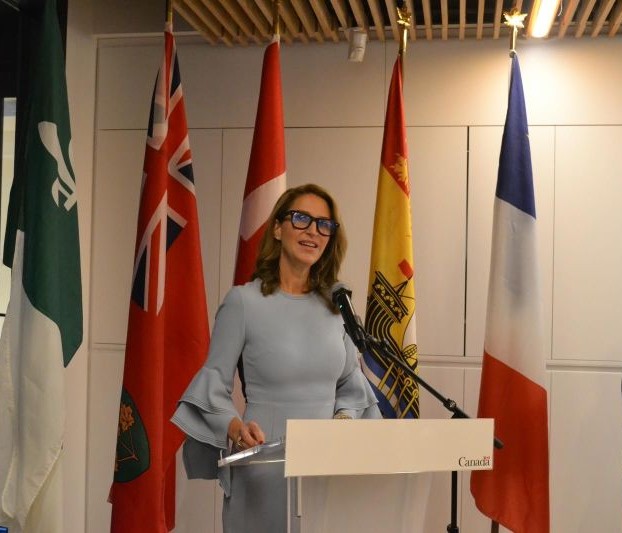
Entertainment at the Village de la Francophonie:
Captivating performances and insightful panels at the Village provided engaging interactions with attendees.
At the Ontario Booth in the Village de la Francophonie: Ontario Francophone Affairs Minister Caroline Mulroney and Deputy Minister Roda Muse surrounded by the Ontario delegation.
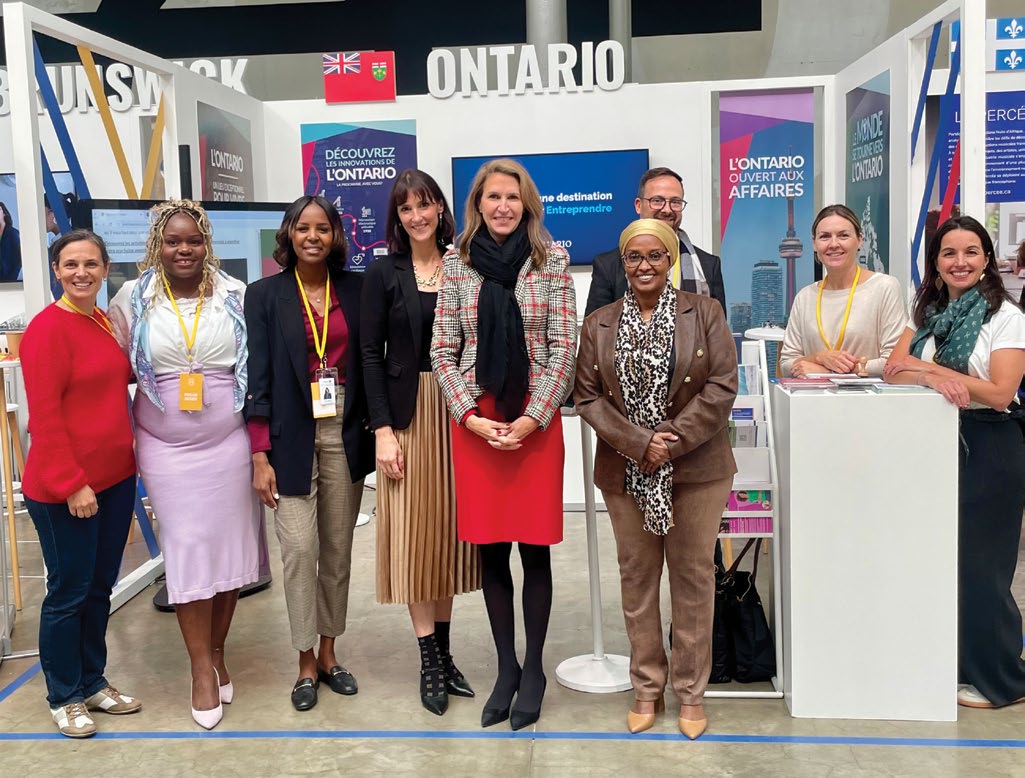
B2B meetings at FrancoTech:
Productive exchanges took place at FrancoTech, which attracted over 2,600 companies from 73 countries, giving rise to discussions and facilitating innovation opportunities between economic players, including some 200 with Ontario delegates.
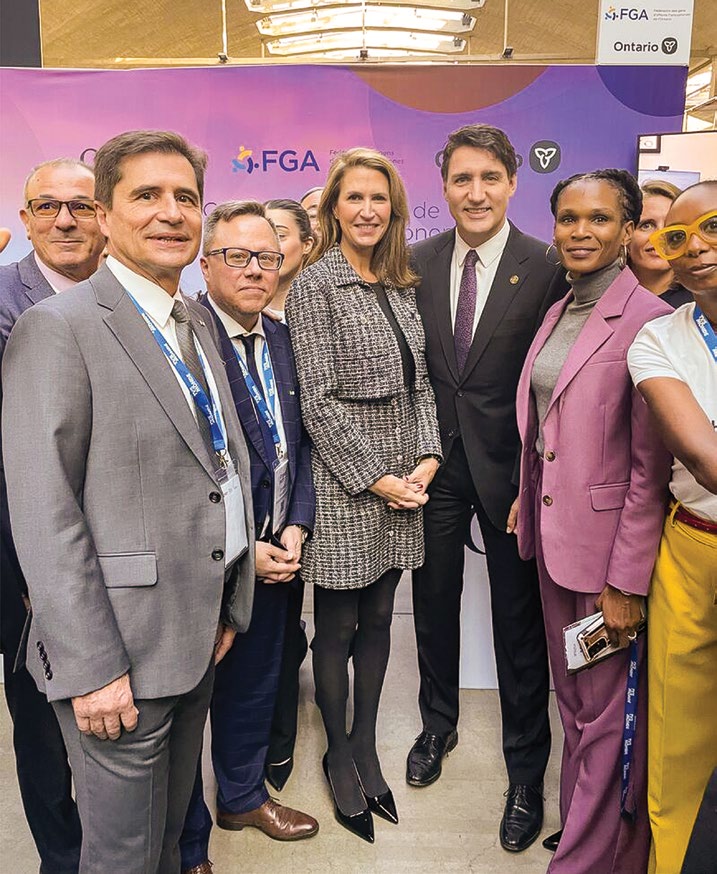
At the FrancoTech FGA booth: The Right Honourable Justin Trudeau, Prime Minister of Canada and the Honourable Caroline Mulroney, Ontario Minister of Francophone Affairs with, from left to right, Richard Kempler, Executive Director, and Dominique Mailloux, President of the FGA, Sabine Soumare, Executive Director of the Women Entrepreneurship Knowledge Hub.
Speaking and networking opportunities:
Ontario’s Minister of Francophone Affairs took part in the official program, strengthening ties with major players in the Francophonie.
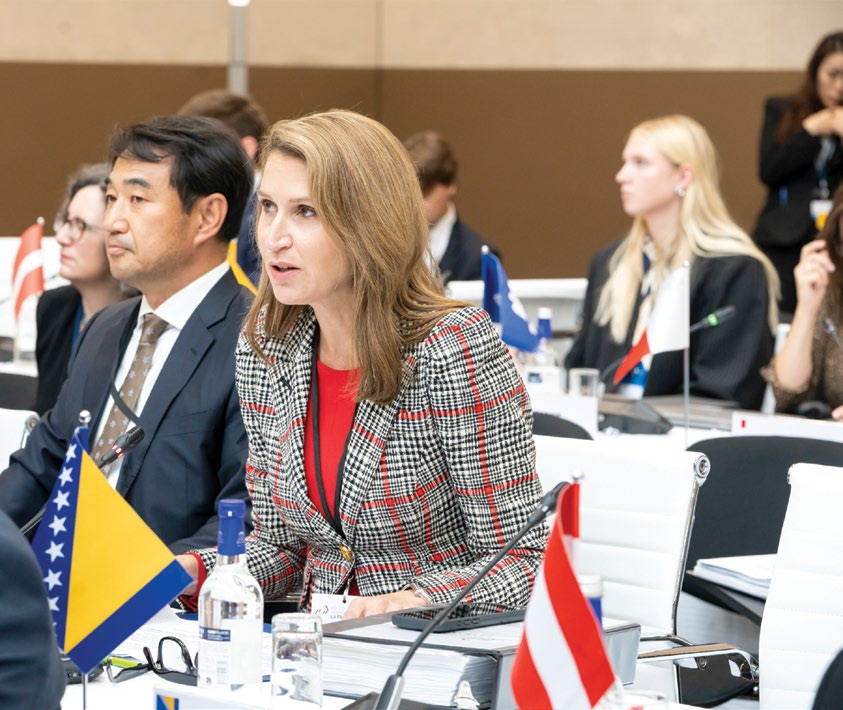
Progress in Bilateral Negotiations Following the OIF Summit
Agreement with the Wallonia-Brussels Fédération: A Growing Partnership
Since the signing of the Memorandum of Understanding in November 2022, Ontario’s ambition is to multiply initiatives to strengthen its ties with Belgium, including;
- Higher education: Successful missions have created strategic partnerships with leading institutions such as the Université de Mons and the Université catholique de Louvain, opening up new prospects for French speaking talent.
- Education: Discussions continue on educational projects aimed at creating closer links between students in Ontario and those in Wallonia.
- Economic Francophonie: By partnering with Wallonie Entreprendre, Ontario has initiated sharing of best practices to stimulate Franco-Ontarian economic initiatives.
- Culture: The bilateral working group is currently reflecting on possible cultural and innovative projects.
Ontario-France Agreement: Strengthened Cooperation for the Future of the French-Speaking World
Continuing its efforts, in April 2024, Ontario’s Ministry of Francophone Affairs signed an historic declaration with the Ministry of Europe and Foreign Affairs of the French Republic. This strategic partnership focuses on promoting the French language and Francophone economic development, thereby strengthening Ontario’s influence on the international stage. A working committee has been established to refine this agreement backed by an action plan.
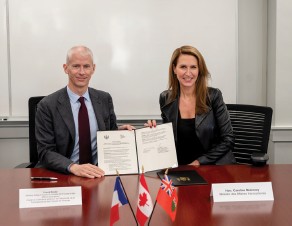
Conclusion
In 2024, Ontario’s Francophonie stood out for its determination, resilience, diversity and influence, within the province, nationally and internationally. This year, considerable progress was made thanks to the strategies deployed to stimulate and support the development of our community. The French Language Services Strategy and the Francophone Economic Development Strategy continue to strengthen access to public services and promote the economic prosperity of the Francophone population, consolidating its place at the heart of Ontario.
The success of these initiatives was built on close collaboration between government, community organizations and local and international partners. These partnerships have made it possible to achieve ambitious goals and continue to build on the foundations of a dynamic and growing Francophone community in Ontario, while facilitating access for the province’s Francophone entrepreneurs to dynamic and promising national and international markets.
Ontario is firmly committed to continuing to promote the Francophonie through concrete actions and lasting partnerships. The year 2024 was crowned with significant progress, and we are confident that these efforts will help ensure a prosperous and sustainable future for Ontario’s Francophonie, serving the entire province and beyond its borders.
